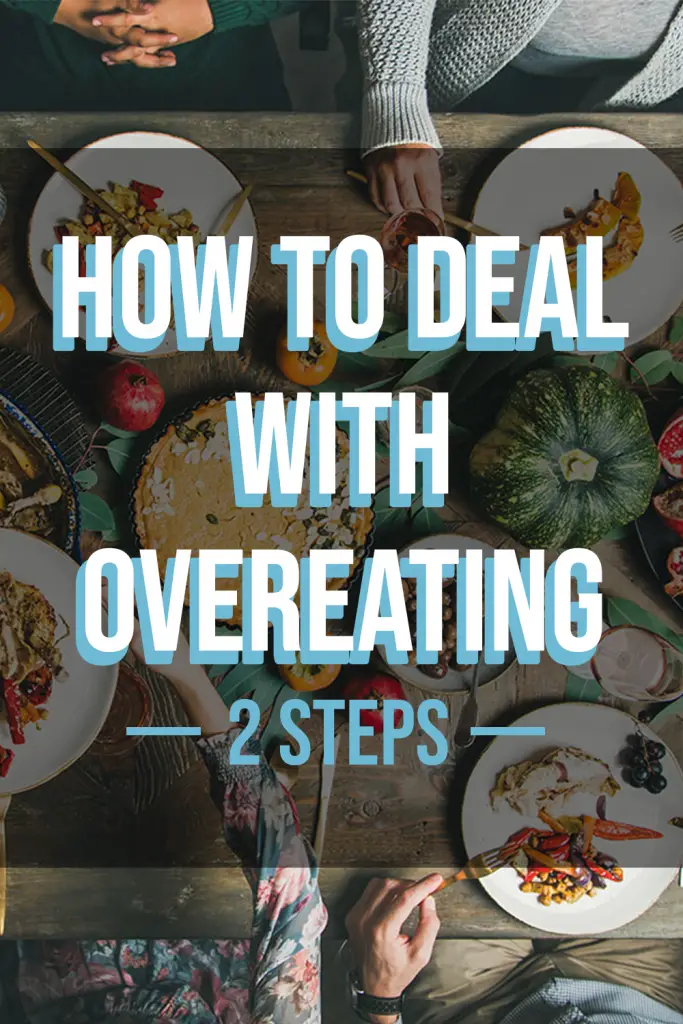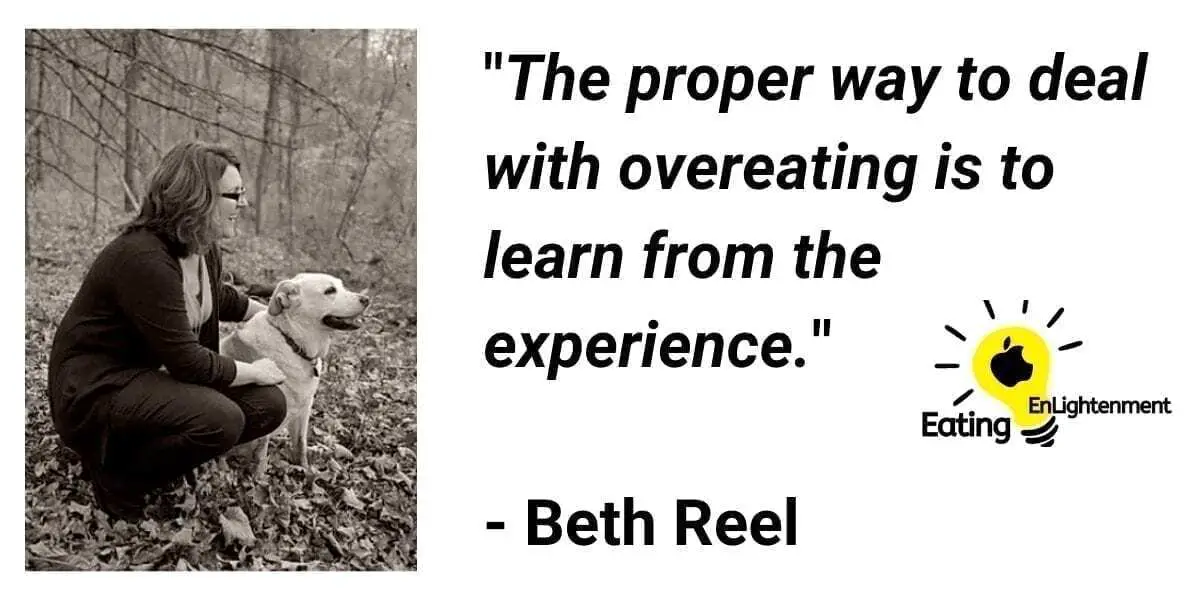Have you ever incredibly upset after eating too much and wondered how to deal with overeating?
For many people this amount of food intake can cause extreme stress.
Especially when you want to get back on track but find your eating habits getting the better of you … once again.
How do you deal with this overeating pattern?
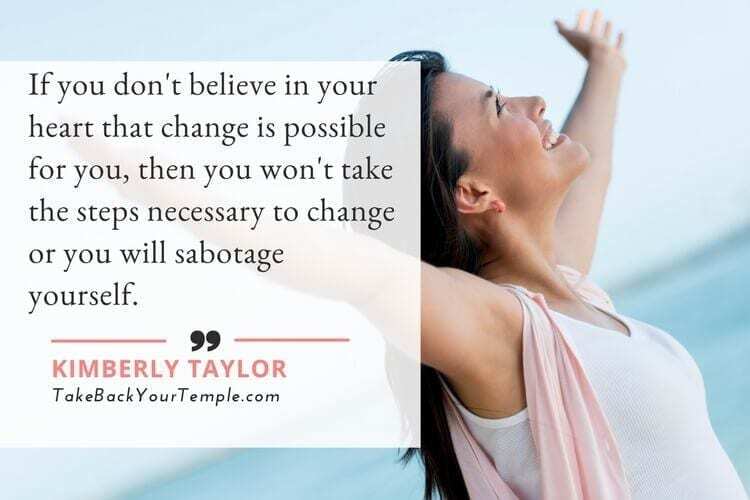
The big picture idea on how to deal with overeating is two-fold:
- Eat mindfully even during a binge
- Reflect afterwards and learn without guilt
These 2 steps are how to deal with overeating.
And these 2 steps hold true throughout the day, with any amount of food.
It doesn’t matter if you feel full of if you feel better about yourself.
And certainly, no matter what your reaction to overeating is …
These two steps still apply.
Please note this article is more about dealing with overeating, than preventing overeating.
3 common reactions to overeating:
- You say “F*** it. I screwed up. I mind as well keep stuffing my face. Tomorrow I’ll make up for it.”
- Guilt and shame. It’s your fault. You suck. You can’t do this whole health food thing. You’re a worthless piece of sh*t.
- Compensation – tons of exercise of throwing up.
Now is that how you want to deal with overeating?
By feeling guilty and wallowing in despair? No.
Hell no.
This post is about how to deal with overeating by changing your reactions to overeating.
To cover these two steps in more detail we are featuring the lovely Beth Reel in a podcast conversation.
This post about how to deal with overeating details:
- How To Deal With Overeating By Eating Mindfully
- Discover Why You Overate – The Movie Technique Beth Used To Decrease Her Overeating Frequency
- How To Avoid The Most Common Blockages (Guilt and Shame)
- How To Set Yourself Up For Success – Baby Steps
How To Deal With Overeating By Eating Mindfully
What if you overeat, but instead of feeling out of control, you allowed yourself to eat as much food as you wanted …
To get as full and fat and stuff your stomach with as much food as you wanted …
But you have to stay mindful throughout the whole process.
(I mean, you’re eating the food anyways, right?)
What if you tried mindfulness? Total mindfulness without any food rules?
Well … this is actually how you set yourself up for success to stop binge eating and emotional eating.
You get rid of diet rules and stop dieting and then really focus on your eating experience.
Let’s see what Beth has to say about mindful eating (at 15:47):
“So we had to agree to not participate in any diet program for the eight weeks. So it really goes back to the mindful eating and intuitive eating piece.
And so there was no food or meal that was off limits.
This whole process required me to entirely re-learn how to relate to my food and study my eating habits throughout the day.
Like how do I eat if I’m going to sit down at the table and I’m going to eat this food without my cell phone in front of me, without the TV on, without reading a book?
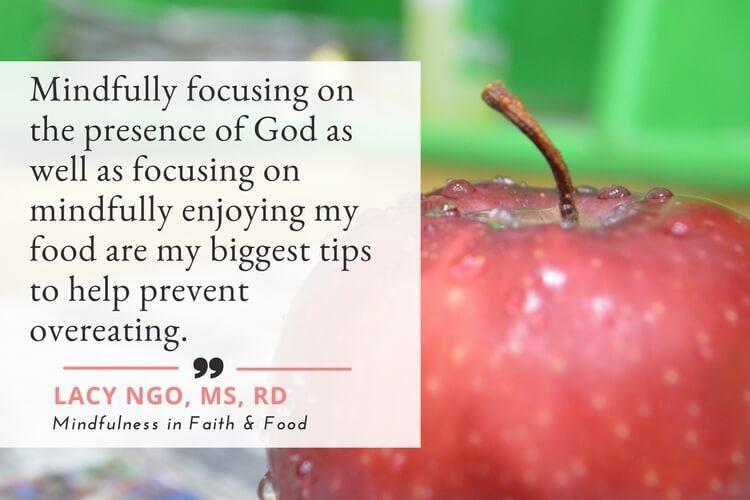
And that’s really where the direction that we moved in was realizing that binge-eating serves a purpose.
There’s a reason my people binge eat. There was a reason why I was binge eating. Lots of reasons why I was eating.
So food is not a bad thing. Hunger, fullness weight … these things are not bad or good.
Food is food is really just food.
We’re the ones who assign good and bad labels to food.
But this whole process was becoming aware of exactly when the binge starts.
For example, so right now I’m heading into the kitchen and I’m going mindless.
Instead of not even remembering when I got off the couch, being in the kitchen and then suddenly coming back to the present moment after halfway through a box of cookies.
So this whole process is being aware, gaining awareness before you sit down at the table to eat.
Then you take the cookies out … taste them, eat them, you know, savor them, smell them, use all of your senses to eat whatever it is you’re going to eat.
This is the first step on how to deal with overeating.
You start mindfully.
Then the next step is figuring out ‘why’ you overate.
Here’s a practical exercise:
The Movie Technique Beth Uses To Decrease Her Overeating
Backing up the movie means you look at what happened before you overate.
- You examine your emotions right before you overate
- What triggered this overeating episode?
- What were you feeling in your body beforehand?
- This is the first step to deal with overeating
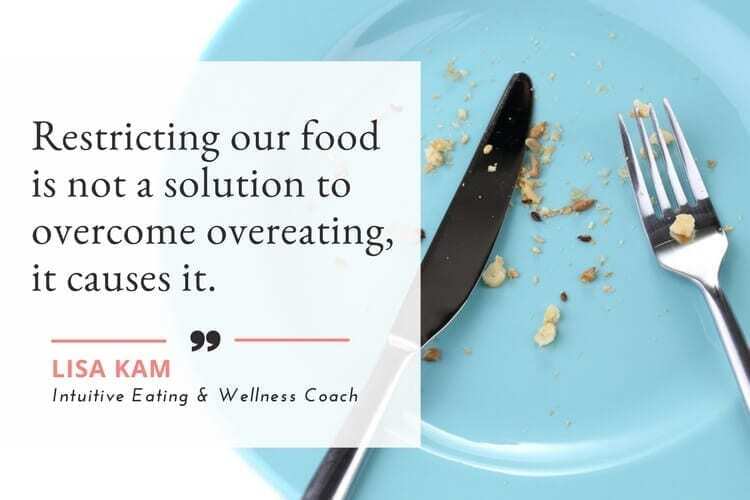
The whole rest of the post centers around this contemplative eating ‘Movie’ exercise.
Put simply this movie exercise is where you self-reflect after you overeat.
(Easier said than done, we’ll talk about guilt and shame down below)
Here’s what Beth has to say (you can watch at 17:50 in the clip above)
“And the other big piece of dealing with overeating was backing up the process. My therapist used to call ‘backing up the movie.’
So what happened before? What happened before you got up off the couch?
This is where mindful meditation comes in … as you’re able to really take a look at yourself and understand what triggered this …
What emotion was happening? What was happening in your body?
This gave me a starting base to understand this overeating process and what was happening to me.”
Learning from your experience particularly in terms of:
- What the hell was going on?
- What emotions were present before I overate?
If you can reflect and analyze after you overeat …
Then you’ll be much wiser next time around.
If you make this a habit to reflect after you overeat …
You will soon discover important patterns that you were missing previously.
Your new awareness of these patterns will help you learn how to deal with overeating …
And eventually you won’t be overeating at all!
But be careful …
This movie technique can oftentimes be blocked or obscured by a very common blockage …
How To Avoid The Most Common Blockages
The most common blockage to dealing with overeating is guilt and shame.
After you overeat a voice runs through your head …
- You’re pathetic
- You have no willpower
- You’re unworthy
This voice right here …
If you let this voice color your perception …
The guilt, stress and shame will prevent you from learning.
You won’t be able to listen to your stomach either. You won’t be able to feel your body, your fullness or your hunger.
Guilt and shame are like an annoying librarian (silly analogy but bear with me!).
You want to study in the library and learn all you can …
But the librarian shuts down the library and makes you go outside!
Guilt and shame are the same. They shut down your learning.
If you’re so hopeless that you can never change, why bother learning and doing this movie exercise in the first place?
So when you ask how to deal with overeating …
It’s very important we also talk about guilt and shame.
Because these will prevent you from learning …
And if you can’t learn …
Then you won’t be able to stop overeating …
(And the ultimate way to deal with overeating is of course to stop overeating! Easier said than done of course)
Case Study Example: How Beth Deals With Overeating
This is the most powerful and poignant part of the interview.
Please watch at 25:24.
Beth describes exactly how she handles a craving to overeat.
Please note that Beth isn’t telling you what the book says to do …
Or what her therapist told her …
This is Beth telling you:
- How she felt nervous
- Found herself eating a cookie
- And went back on with her life
Now please note that Beth did not overeat here, but you can see how she handles herself.
- She recognizes her emotions
- Beth allows herself to eat.
- She stays connected and mindful through her eating experience.
- Beth doesn’t blame herself.
Just watch her vulnerability and presence. She’s beautiful 🙂
“Let’s, let’s play real time. Why not, right?
So I’m feeling really nervous about going on this interview with Jared and being vulnerable.
And I picked up a bag of cookies that are super duper awesome, amazing. So I’m looking at the questions that Jared sent to me and I’m thinking, “what am I doing?”
“Who the heck am I to talk about this stuff?” And all of a sudden I am down in the kitchen.
Next thing I know I have my hand in the bag of cookies and I’m aware at this point, right?
I know exactly what I’m doing (about to emotional eat) and I stop and I put the bag of cookies down and I’m like, “okay, what’s happening for me right now?”
I’m feeling this nervous energy in my body, I’m feeling this anxiety, and I’m feeling like all of this stuff.
And right now I’m having this cookie. I’m having one.
I’m sitting down and I’m tasting the cookie and I’m not going to be on my phone and I’m not going to be reading.
And okay, I had the cookie and now I’m heading back down to my office.”
And the key point here …
Is how little Beth reacted.
She was nervous. She had a cookie. And then went back into the office.
Hardly anything happened.
And that’s the point.
She avoided the most common obstacle of guilt and shame.
How Do I Get Rid Of Guilt And Shame?
The most powerful way to get rid of guilt and shame is to practice compassion.
Guilt and shame are like an unbalanced teeter totter.
The guilt and shame are way up high!
On the opposite end is compassion.
If you have very little compassion the guilt and shame will seem insurmountable.
But with compassion you can avoid start to feel better about yourself even if you feel full, like way too full.
This is so powerful. At any point throughout the day you can practice compassion to reduce stress and give yourself a break.
You’re self-hatred of being fat (if you are a bigger person) isn’t helping. Compassion does help.
If you can grow your compassion and kindness towards yourself … you’ll be able to balance out the teeter totter.
Guilt and shame won’t be such a big thing getting in your way.
What does Beth have to say about compassion?
When I first practiced kindness and compassion after overeating I was like “Whoa, what is that? Who is that? I want more of that.
You can discover your inner kindness by trying
Kindness will dramatically change your relationship to overeating
The voice of compassion allows you to enjoy food while still setting limits
At 28:04 Beth says …
“Kindness and compassion were not something that I grew up with.
But I was able to give kindness and compassion to my kids (because I had practiced).
You know, life is not about a diet and it’s not perfection.
And I’m not the person who’s going to be on the podcast saying, “I just stopped binge eating and that was it. And I never bent binged again. That’s not how it is. And I’m going to be completely honest about that.”
But even though I didn’t stop binge eating (and still have cravings to this day) I felt the benefits of kindness and compassion.
I call this voice of kindness my inner coach and I have this super awesome, sweet inner coach who’s grown up and doesn’t let me eat all the cookies (unless I really want one and even then my inner coach let’s me enjoy the food while setting limits).
Giving myself that kindness and compassion to myself after eating was huge for me because kindness towards myself has been one of my biggest struggles in my life.
When I first practiced kindness and compassion after overeating I was like “Whoa, what is that? Who is that? I want more of that.”
Do you hear how Beth is speaking?
She’s speaking gently.
And Beth says that the first time she practiced compassion she was really surprised!
It almost sounded like Beth had been practicing kindness towards herself for sometime … without any results …
And then one day it ‘clicked.’
What can you do if you are practicing kindness towards yourself (in attempts to deal with overeating better) and haven’t made any progress?
How To Set Yourself Up For Success – Baby Steps
Now we all know if you have been following this blog or podcast or any time that…
The Just do It mindset is terrible and harms people.
Just diet.
Just lose weight.
And if we are careful, then this whole deal with overeating with kindness… Can backfire.
Just be kind to yourself.
But what if you don’t have any kindness batteries?
What if your role models growing up as a kid were not kind to you?
How do you connect to kindness and deal without reading?
Let’s see what Beth has to say:
- Get a feeling of connection
- Find something you can choose instead of food
- Apply the principle of baby steps
“I’m feeling so connected when I’m out in the woods and with the trees. This makes me feel centered and connecting with something greater than myself.
And for me, the more I went outside, the less I felt like I needed to go back and use food as a way to cope.
It was like, “Okay, I’m okay, I’m okay.”
Going outside helped me get in touch with my body and then if I was feeling upset about something I would be more inclined to go outside more than I chose food.
And I can’t say ending binge eating happened like happened over night, but everything to me is everything is baby steps.”
Here are some ways you can start taking baby steps right now!
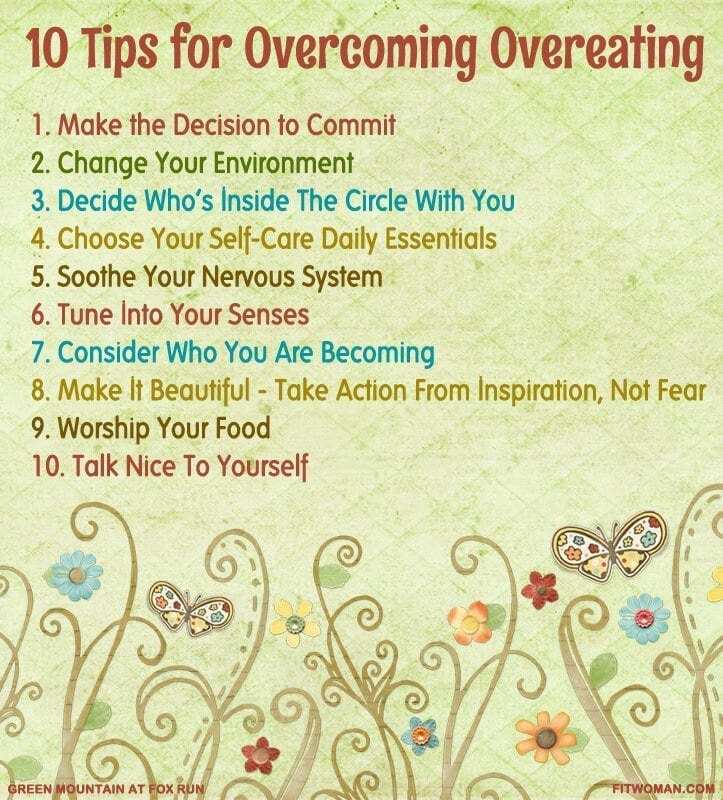
More About The Baby Step Principle To Deal With Overeating
Now another principal that Beth practices herself is the idea of taking small baby steps.
This principal is important because when we are talking about how to deal with overeating…
You are much more likely to overeat if you bite off more than you can chew.
If you try to practice all at once:
- Mindful eating
- Avoid guilt and shame
- Study your triggers
- Don’t judge your appetite
- Relax. Don’t be hard on yourself
- Don’t overfocus on weight loss
If you try to do all these things at once you’ll feel overwhelmed!
Now please note these are all appropriate ways to deal with overeating …
But you still have to learn in a gradual way.
Because the heart of this training about overeating is being able to feel difficult emotions. And this is difficult!
You don’t just go from years of using food to cope with emotions to being wise around food overnight!
No. There will be times when you get overwhelmed.
What happens if you get overwhelmed?
Please expect you will get tired of feeling your difficult emotions.
There will be times when you need to back this whole process and just let yourself mindfully eat what you want.
How did Beth handle this tough times?
At 22:43 Beth says that she called her therapist and …
“I said, you need to call me back because I can’t do this. I’m out. I’m done. I know I can’t do this. This is way too hard. I was like having anxiety about it.
Oh by the way, I’m a recovering perfectionist. So the fact that I couldn’t do this program perfectly was incredibly stressful.
I wanted to go through a linear process of feeling my feelings and check off the box.
But it doesn’t work that way. And I thought I couldn’t do it.
So for me I realized that …
I’m going to take five steps in and I’m going to work this for a little while.
Then I’ll need to take a step back and sort of recoup.
And sometimes that meant binge-eating decreased, followed by binge eating increased. And for me it was, you know, a process that unfolded.
The key was that every single time I learned something about myself.”
So if you are feeling guilt and shame and like you can’t do handle your feelings …
That’s ok.
Take a break. Come back and feel your feelings later. It’s ok to use food to soothe yourself.
Just no guilt. No shame. It’s ok.
